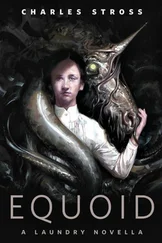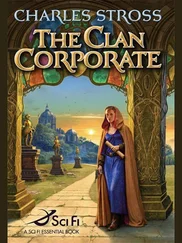He nodded, then bent over it for a few seconds. “Ah, that’s better.” Cold blue eyes, pinprick pupils. “The core of the matter. In the hypothetical case that I was to charge you with implementing U. Scott’s plan and carrying it to completion, for the greater good of the clade—” he sent a flickering glance in the direction of the stage, and at that moment Hoechst realized that despite every protestation of privacy, he believed the Propagators or the Arm might be watching, might have corrupted his own puppet master — “how would you go about it?”
Oh. Oh. Portia shivered, appalled by the vista of opportunities before her. This could mean her elevation to parity with Blumlein, to board level for an entire planet if she played her hand successfully. An almost sexual thrill: Then nobody could touch me! To be in control of the mechanics — she clamped down on the thought immediately, before it could form. First things first. The cost would be high, the temptation to Blumlein to have her executed before she could become a threat would be enormous …
Composing herself, she nodded slightly and picked up her glass. “I would first have to assure myself that I had the approval of the Directorate,” she began, not glancing at the stage. “Then, once I had that, I’d pursue U. Scott’s general plan, but directing events on-site in person rather than entrusting control to an extra layer of subordination. I don’t believe you can have a sufficiently tight grasp on an action if you try to exercise remote control; every level of authority you delegate adds delay and an additional risk of failure, and the plan has too many contingencies to entrust command to a junior puppeteer who lacks the big picture. And I’d divert the target of his enterprise to a, ah, more acceptable one…”
Centris Magna was a boringly average asteroid colony, built to a classic design that didn’t rely on gravity generators: a diamond tube fifty kilometers along the main axis and eight kilometers in diameter, spinning within the hollowed-out husk of a carbonaceous chondrite somewhere in Septagon Four’s inner debris belt. The inner core consisted of service facilities while the outer, high-gee levels were mostly zoned as parklands or recreational zones: the occupants lived in multilevel tenements in the mid-gee cylinders. It was a pattern repeated endlessly throughout the Septagon systems, among the hundreds of worldlets that made up the polity that had taken in most of the refugees from Moscow. And three years after her arrival, Wednesday had learned to hate it, and the grinding poverty it rubbed her nose in every minute of every day.
“Wednesday?” Her father’s voice was attenuated by her barely open bedroom door: if she pulled it shut, she could block him out completely. But if she pulled it shut -
“Wednesday. Where are you?”
Biting her tongue in concentration she finished tying her bootlaces, getting them perfect. There. She stood up. Boots, new boots, nearly knee high, gleaming like black mirrors over her skintight cloned pantherskin leggings. “Here, Dad.” Let him find her. A last look in the window, set to mirror-mode, confirmed that her chromatophores were toned in: blood-red lips, dead white skin, straight black hair. She picked up her jacket and stroked it awake, then held out her arms and waited for it to crawl into place and grip her tightly at elbows and shoulders. Nearly ready—
“Wednesday! Come here.”
She sighed. “Coming,” she called. Quietly, to herself: “Bye, room.”
“Goodbye,” said her bedroom, dimming the lights as she opened the door, feeling tall and slightly unbalanced in her new boots and headed through to the living room, where Dad would probably be waiting.
Morris was, as she’d expected, in the main room of the apartment. It was a big open space, a mezzanine floor upstairs on top of the dining room providing him with an office from which he could look down on the disordered chairs and multiforms of the communal area. Jeremy had been trying to undo amah’s housekeeping again, building an intricate dust trap of brightly colored phototropic snowflakes in the middle of the antique dining table that Dad periodically insisted they sit around for formal meals. The dust trap writhed toward her when she opened the door. Her father had been watching a passive on the wall; it froze as he looked round at her, ancient avatars looking impossibly smooth and shiny in the perspective-bending depths. “What’s that you’re wearing?” he asked wearily.
“Sammy’s throwing a party tonight,” she said, annoyed. (She almost added, How come you never go out? — but thought better of it at the last minute.) “I’m going with Alys and Mira.” Which was a white lie — she wasn’t talking to Mira, and Alys wasn’t talking to her — but they’d both be there, and anyway did it really matter who she went with when it would only take ten minutes and she’d be out all night? “First time out for my new boots!”
Dad sighed. He looked unwell, his skin pasty and bags under his eyes. Too much studying. Study, study, study — it was all he ever seemed to do, roosting up on top of the kitchen roof like a demented owl-bird. Smart drugs didn’t seem to help; he was having real difficulties assimilating it all. “I was hoping to have some time to talk with you,” he said tiredly. “Are you going to be out late?”
“All night,” she said. A frisson of anticipation made her tap her toes, scuff the floor: they were remarkably fine boots, shiny, black, high-heeled and high-laced, with silver trim. She’d found the design in a historical costuming archive she’d Dumpstered, and spent most of a day turning them into a program for the kitchen fab. She wasn’t going to tell him what the material had cost, real vat-grown leather like off a dead cow’s skin made some people go “ick” when you told them what you were wearing. “I like dancing,” she said, which was another little white lie, but Dad still seemed to harbor delusions of control, and she didn’t want him to get any ideas about grounding her, so making innocent noises was a good idea.
“Um.” Morris glanced away, worried, then stood up. “Can’t wait,” he mumbled. “Your mother and I are going to be away all day tomorrow. Sit down?”
“All right.” Wednesday pulled out one of the dining table chairs and dropped onto it back to front, arms crossed across the back. “What is it?”
“We’re — your mother and I, that is, uh—” Flustered, he ground to a halt. “Um. We worry about you.”
“Oh, is that so?” Wednesday pulled a face at him. “I can look after myself.”
“But can you—” He caught himself, visibly struggling to keep something in. “Your school report,” he finally said.
“Yeah?” Her face froze in anticipation.
“You’re not getting on well with the other children, according to Master Talleyrand. He, they, uh, the school social board, are worried about your, um, they call it ‘acculturation’.”
“Oh, great!” she snapped. “I’ve—” She stopped. “I’m going out,” she said rapidly, her voice wobbling, and stood up before he could say anything.
“We’ll have to talk about this sometime,” he called after her, making no move to follow. “You can’t run away from it forever!”
Yes I can: watch me. Three steps took her past the kitchen door, another hop and a skip — risking a twisted ankle in the new boots — took her to the pressure portal. Pulse hammering, she thumped the release plate and swung it open manually, then dived through into the public right-of-way with its faded green carpet and turquoise walls. It was dim in the hallway, the main lights dialed down to signify twilight, and apart from a couple of small maintenance ’bots she had the passage to herself. She began to walk, a black haze of frustration and anger wrapped tightly around her like a cloak. Most of the front doors to either side were sealed, opening onto empty — sometimes depressurized — apartments; this sub-level was cheap to live in, but only poor refugees would want to do so. A dead end, like her prospects. Prospects — what prospects? From being comfortably middle-class her family had sunk to the status of dirt-poor immigrants, lacking opportunities, looked down on for everything from their rural background to things like Wednesday’s and Jerm’s implants — which had cost Morris and Indica half a year’s income back on Old Newfie, only to be exposed as obsolete junk when they arrived here. “Fucking social board,” she muttered to herself. “Fucking thought police.”
Читать дальше












